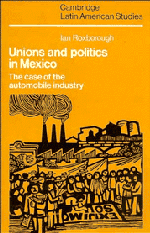Book contents
- Frontmatter
- Contents
- List of tables
- List of figures
- Acknowledgements
- Dedication
- Preface
- List of abbreviations
- Map: Location of automobile plants
- 1 Organized labour in Mexico
- 2 The Mexican automobile industry
- 3 Wages and workers in the Mexican automobile industry
- 4 The unions: a historical analysis
- 5 The unions: power and organization
- 6 Control over work processes
- 7 Union government
- 8 The labour courts
- 9 The empirical findings and the dynamics of industrial militancy
- 10 Unions and political stability in Mexico
- Notes
- Bibliography
- Index
- CAMBRIDGE LATIN AMERICAN STUDIES
6 - Control over work processes
Published online by Cambridge University Press: 04 August 2010
- Frontmatter
- Contents
- List of tables
- List of figures
- Acknowledgements
- Dedication
- Preface
- List of abbreviations
- Map: Location of automobile plants
- 1 Organized labour in Mexico
- 2 The Mexican automobile industry
- 3 Wages and workers in the Mexican automobile industry
- 4 The unions: a historical analysis
- 5 The unions: power and organization
- 6 Control over work processes
- 7 Union government
- 8 The labour courts
- 9 The empirical findings and the dynamics of industrial militancy
- 10 Unions and political stability in Mexico
- Notes
- Bibliography
- Index
- CAMBRIDGE LATIN AMERICAN STUDIES
Summary
Control over work processes
In day-to-day industrial relations in Western Europe and the United States, a host of formal and informal agreements about work loads and speeds have developed. This has created a complex of ‘custom and practice’, which is often at the heart of industrial conflict. Custom and practice are the result of the struggle of several generations of trade unionists to bargain, at the plant level, over effort. There have, of course, been managerial counter-offensives, and the outcome of this unceasing struggle has not always been to labour's advantage.
The fact that custom and practice are embedded in the concrete work situation makes investigation and measurement difficult. It indicates that a study of formal agreements such as collective contracts may seriously misrepresent the situation, by underestimating the importance of unwritten, but real, custom and practice.
Because the research in Mexico did not have the resources to investigate the reality of day-to-day industrial relations on the shop floor, the results reported below must necessarily be treated with a certain degree of caution. Nevertheless, as was argued in the preceding chapter, the highly formal and legalistic features of Mexican industrial relations mean that important gains by unions and management tend to be explicitly acknowledged in collective contracts. This may be in the nature of a post factum assertion about previous practice, designed to prevent gains achieved in daily negotiations from subsequently being eroded on the shop floor, or these issues may be raised and fought for primarily around the negotiating table.
- Type
- Chapter
- Information
- Unions and Politics in MexicoThe Case of the Automobile Industry, pp. 120 - 131Publisher: Cambridge University PressPrint publication year: 1984

